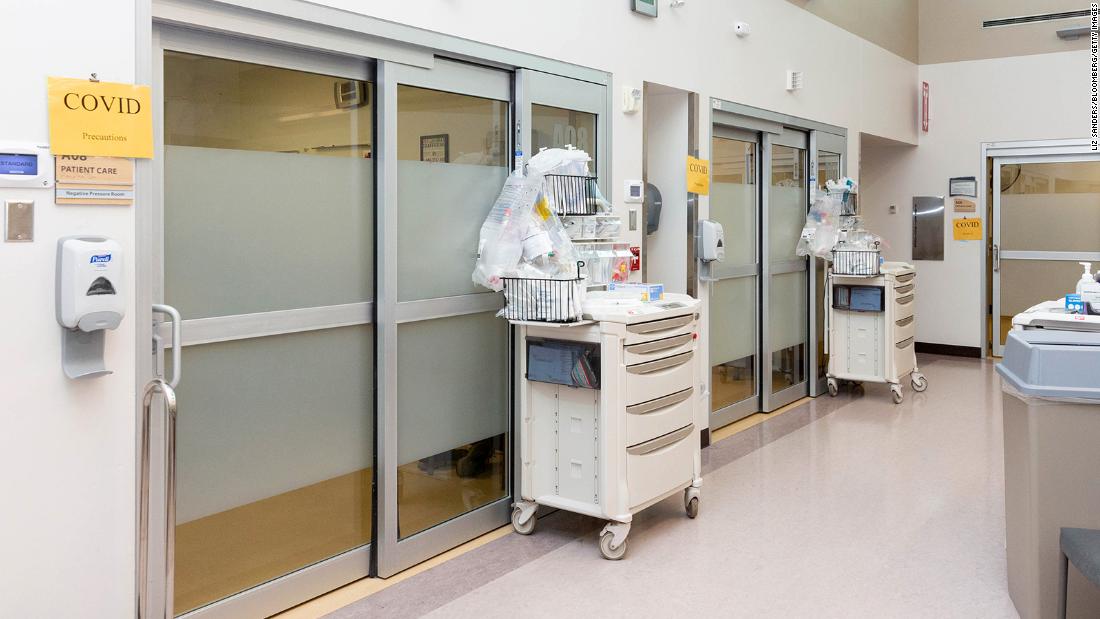
The US is averaging about 19,455 new cases over the last seven days, a 47% increase from the week prior, according to data from Johns Hopkins University. And a third of those, CNN Medical Analyst Dr. Jonathan Reiner said, come from five hotspots: Florida, Louisiana, Arkansas, Missouri and Nevada.
"In places like Missouri where ICUs are packed, you're going to see a surprising amount of death," Reiner said on Sunday.
At Mercy Hospital in Springfield, Missouri, 91% of ICU patients are on ventilators and many are in their 20s, 30s and 40s, Chief Administrative Officer Erik Frederick told CNN Saturday. That is especially concerning, he said, because at the peak last year there were only 40 to 50% of ICU patients on ventilators.
Typically, increases in Covid-19 death rates follow three to four weeks behind spikes in cases, Reiner said. It takes a week for patients to get sick enough to need hospitalization and then often another couple of weeks for the infection to become fatal.
"We will start to see an increase in mortality in this country," Reiner said.
What is particularly frustrating for many experts, Reiner said, is that the deaths are "completely avoidable" now that vaccines are available.
But about one third of those 12 and older in the US haven't received the vaccine yet, CDC data shows.
"The vaccines we have work really well against this variant. It doesn't need to be this way," Reiner said.
Experts weigh whether vaccinations should be mandated
Much of the rising cases have been attributed to the now dominant Delta variant, which is believed to be more transmissible. And the variant has sparked discussions over local vaccination mandates.
Across the US, 48% of the population is fully vaccinated, but in some states that number is much lower, according to CDC data. Alabama, Arkansas, Louisiana, Wyoming and Mississippi all have around 35% or less of their populations fully vaccinated.
Experts say vaccines are key to managing spread. With information changing rapidly, it is important to be smart about how vaccinations are mandated, Professor of Medicine George Washington University School of Medicine Dr. Gigi El-Bayoumi said.
"In states where there are high vaccination rates, that are like 75 or above, it makes sense to loosen up the restrictions. In places where there are not, such as some of the Southern states, it makes sense" to mandate vaccinations, El-Bayoumi said Sunday.
Dr. Anthony Fauci, director of the National Institutes of Allergy and Infectious Disease, told CNN he thinks it's a good idea for mandates at the local level.
"We're talking about life and death situation. We've lost 600,000 Americans already, and we're still losing more people. There've been 4 million deaths worldwide," Fauci said. "This is serious business."
He added that he expects vaccine mandate hesitancy to lift when vaccines are fully approved.
Right now, the available Covid-19 vaccines are being administered under emergency use authorizations, which Fauci said has made some people skeptical as to their safety and efficacy. But the amount of data that supports the importance and safety of the vaccines is more than anything experts have seen for an EUA, he said.
"These vaccines are as good as officially approved with all the I's dotted and T's crossed," Fauci said.
Pfizer to brief the US on boosters
Another concern for many experts as variants spread is whether the population will need boosters for their vaccines.
Pfizer will virtually brief US government officials Monday evening regarding the potential need for booster shots of its Covid-19 vaccine, a company spokesperson and two administration officials confirmed to CNN.
The meeting is seen as a courtesy, and federal guidance on boosters is not expected to change immediately following the meeting, a senior health official said.
Last week, Pfizer/BioNTech reiterated their expectation that people may need boosters to their vaccinations in six months to a year, citing waning immunity they are seeing among people who received their vaccine. The company also said it would seek emergency use authorization for a booster from the US Food and Drug Administration in August.
But some experts have argued the data is showing boosters are not necessary yet.
"Americans who have been fully vaccinated do not need a booster shot at this time," the US Centers for Disease Control and Prevention and the FDA said. "FDA, CDC, and NIH (the National Institutes of Health) are engaged in a science-based, rigorous process to consider whether or when a booster might be necessary."
Fauci also disputed the need at this time on CNN's "State of the Union."
"Given the data and the information we have, we do not need to give people a third shot, a boost, superimposed upon the two doses you get with the mRNA (Pfizer/BioNTech and Moderna vaccine) and the one dose you get with (Johnson & Johnson)," he told CNN's Jake Tapper
Fauci said that there are ongoing studies evaluating if and when the US will recommend booster shots.
COVID-19 - Latest - Google News
July 12, 2021 at 03:27PM
https://ift.tt/3hAqvLE
'Surprising amount of deaths' will soon occur in these US regions from increased Covid cases, expert says - CNN
COVID-19 - Latest - Google News
https://ift.tt/2VQ2gy8

No comments:
Post a Comment